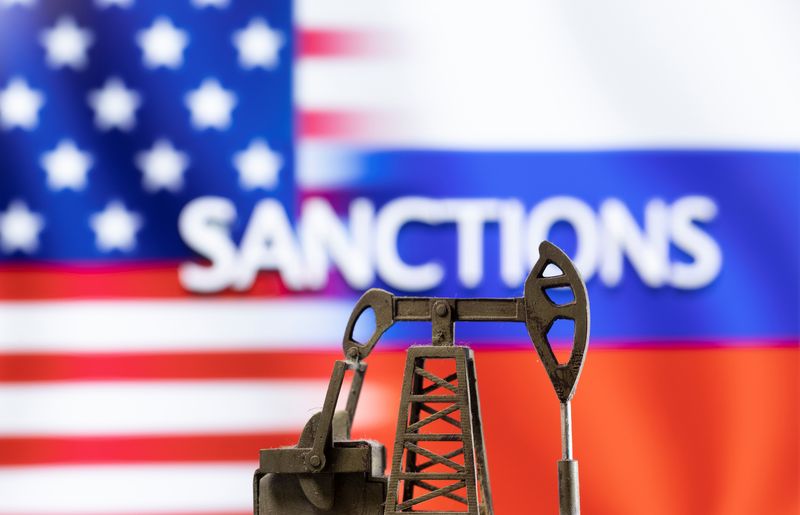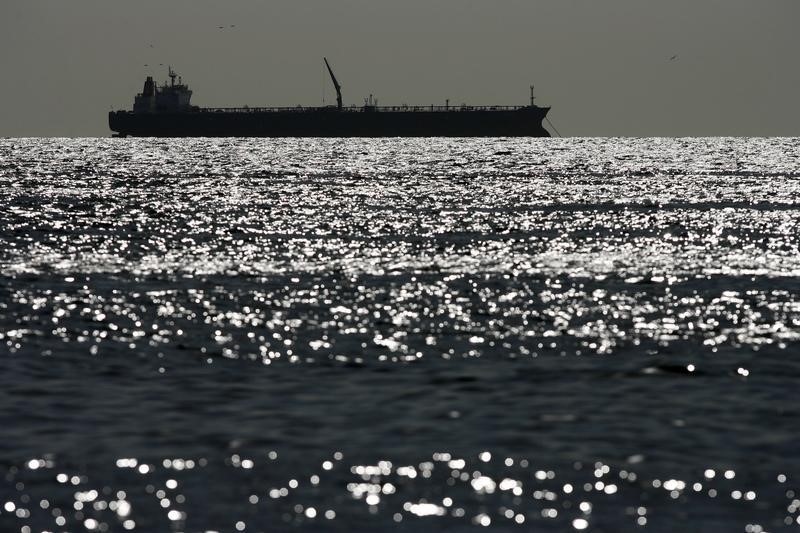By Timothy Gardner and Daphne Psaledakis
WASHINGTON (Reuters) -The U.S. on Thursday imposed the first sanctions on owners of tankers carrying Russian oil priced above the G7's price cap of $60 a barrel, one in Turkey and one in the United Arab Emirates, in an effort to close loopholes in the mechanism designed to punish Moscow for its war in Ukraine.
The U.S., other G7 countries and Australia imposed the cap last year, seeking to reduce Russia's revenues from seaborne oil exports as part of sanctions for its invasion of Ukraine.
The cap bans Western companies from providing maritime services, including insurance, finance and shipping, for Russian seaborne oil exports sold above $60 a barrel, while seeking to keep oil flowing to markets. Caps also were imposed on Russian fuel exports.
U.S. President Joe Biden's administration placed sanctions on Turkey-based Ice Pearl Navigation SA, owner of the Yasa Golden Bosphorus, which the Treasury said carried Russian ESPO crude priced above $80 a barrel after the cap took effect in December last year.
The U.S. also imposed them on UAE-based Lumber Marine SA, owner of the SCF Primorye, which the Treasury said was carrying Novy Port Russian crude above $75 per barrel.
"Because of the actions we're announcing today, and the further actions we will take in the coming weeks and months, these costs will continue to rise and Russia's ability to sustain its barbaric war will continue to weaken," a senior Treasury official, speaking on condition of anonymity, told reporters in a call.
The measures identify and block access to all property and interests owned by the companies in the U.S.
The price cap coalition also issued recommendations for the maritime industry including: a requirement for "appropriately capitalized" protection and indemnity insurance, agreed protocols on the use of Automatic Identification Systems and enhanced checks of high-risk ship-to-ship cargo transfers.
Both tankers, which conducted port calls in Russia, used U.S.-based service providers while transporting the Russian origin oil, the Treasury said without answering questions about those providers.
The U.S. service providers would not be at risk of sanctions if they had been provided false or misleading information by others in the shipping chain about the price of Russian oil, said a price cap coalition official on condition of anonymity.
Turkey's Yasa Holding, operator of the Golden Bosphorus, said it had necessary documentation from major London insurers for it to carry Russian origin cargoes and that it has been company policy for more than a year to not carry Russian crude.
Yasa said the vessel is currently under time-charter for three to five months with Exxon Mobil (NYSE:XOM).
The U.S. oil major said it does not trade Russian oil or oil products. "These deliveries are certified products of Canadian origin," Exxon said about the chartering.
A price cap coalition official speaking on condition of anonymity said Exxon was not a target of the sanctions and that the company had chartered the vessel after it had carried Russian oil.
GHOST FLEET
Global oil prices have risen to around $85 a barrel in recent months on production cuts and thin world spare production capacity. That has helped to limit the efficacy of the cap, but the coalition can toughen enforcement to make it more effective, according to people who advised the Treasury.
Russian crude oil exports last month stood at 4.9 million barrels per day, down about 100,000 bpd from the May-June average, the International Energy Agency (IEA) estimated on Thursday. But it also said Russia's total exports of crude oil and products in September rose by 460,000 bpd to 7.6 million bpd, with crude accounting for 250,000 bpd of the increase.
The cap has forced Russia and traders to invest in what the industry refers to as a ghost fleet of old tankers vulnerable to leaks and oil spills. Those vessels are undertaking long voyages to deliver crude to refiners in China and India, which have become the largest buyers of Russian crude. Neither country has imposed sanctions on trade with Russia.
The cap forces Russia to pay about $36 a barrel for those non-Western maritime services, expenses that go to "tankers not tanks" in the Ukraine war, the U.S. Treasury official said.

Treasury Secretary Janet Yellen on Wednesday said the price cap had sharply reduced Russian revenues over the past 10 months, and that it was critical to keep imposing severe and increasing costs on Russia.
Andriy Yermak, the head of Ukraine's presidential office, said on the Telegram messaging app the sanctions resulted from studies by an international working group he helped create and that violations of the Russian oil price cap will be punished.
